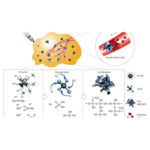 A team of researchers from the Shanghai Institute of Ceramics, Chinese Academy of Sciences and the East China Normal University have developed polyvinyl pyrrolidone modified nanoparticles that serve as a deoxygenation agent against tumor cells. The therapy, which is described in Nature Nanotechnology, targeted cancer cells by cutting off the tumor’s blood supply to deprive and ‘suffocate’ tumor cells.
A team of researchers from the Shanghai Institute of Ceramics, Chinese Academy of Sciences and the East China Normal University have developed polyvinyl pyrrolidone modified nanoparticles that serve as a deoxygenation agent against tumor cells. The therapy, which is described in Nature Nanotechnology, targeted cancer cells by cutting off the tumor’s blood supply to deprive and ‘suffocate’ tumor cells.
The agent is sensitive to changes in acid levels in the bloodstream, efficiently consumes oxygen and could create a product to aggregate and potentially block blood vessels, the team wrote. Preliminary work in mice models showed that the agent is biocompatible and establishes tumor hypoxia.
The team’s work demonstrated that the nanoparticles had very little cytotoxicity until they came upon the acidic environment of the cancer cell. In other words, the therapy effectively targeted cells and localized treatment to the area of the tumor.
In vivo studies in mice models showed that the nanoparticles are efficient deoxygenation agents – after 10 minutes, blood oxygen saturation levels did not change in control tumors, but drastically reduced in the test group. The team pointed out that imaging revealed that hypoxia occurred within the tumor and not in the surrounding tissue.
Compared to the control tumors, the cells that received the nanoparticle-based treatment demonstrated a slower growth rate and the cells had evidence of fibrosis, necrosis and apoptosis.
The team suggested that further work should be done to explore surface modifications to the nanoparticles, hypothesizing that researchers could customize the length of time the nanoparticles travel through the blood stream.

